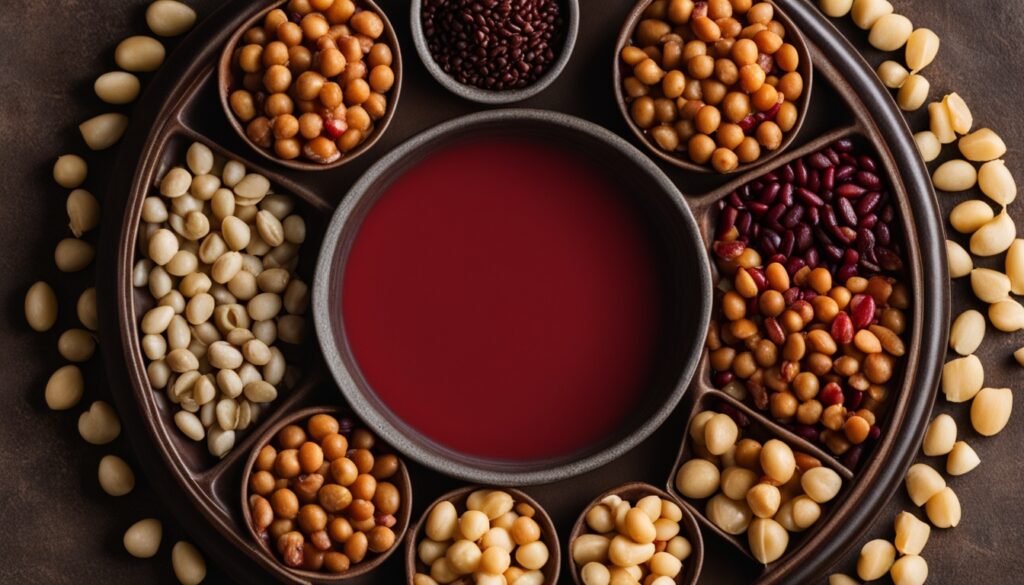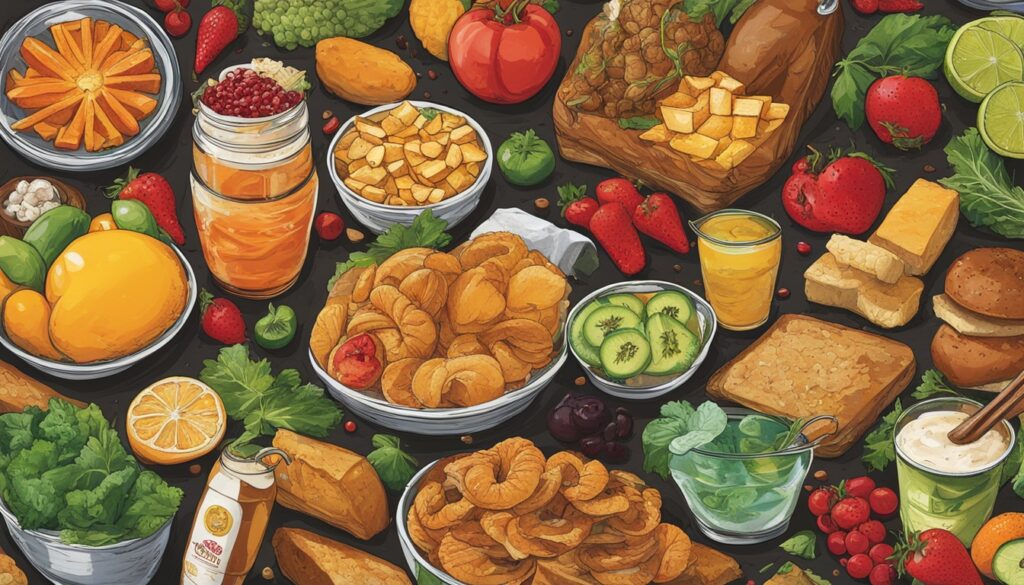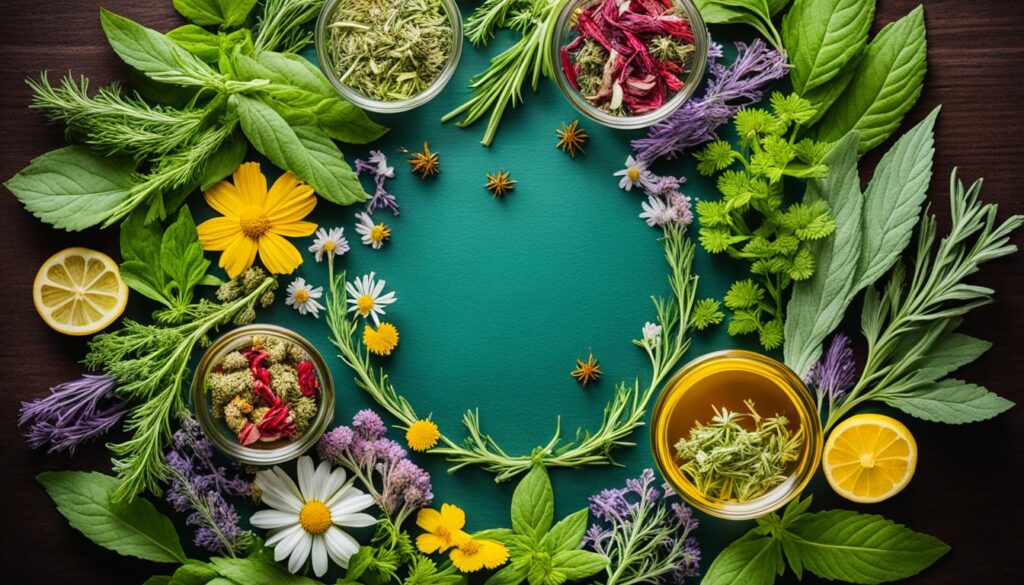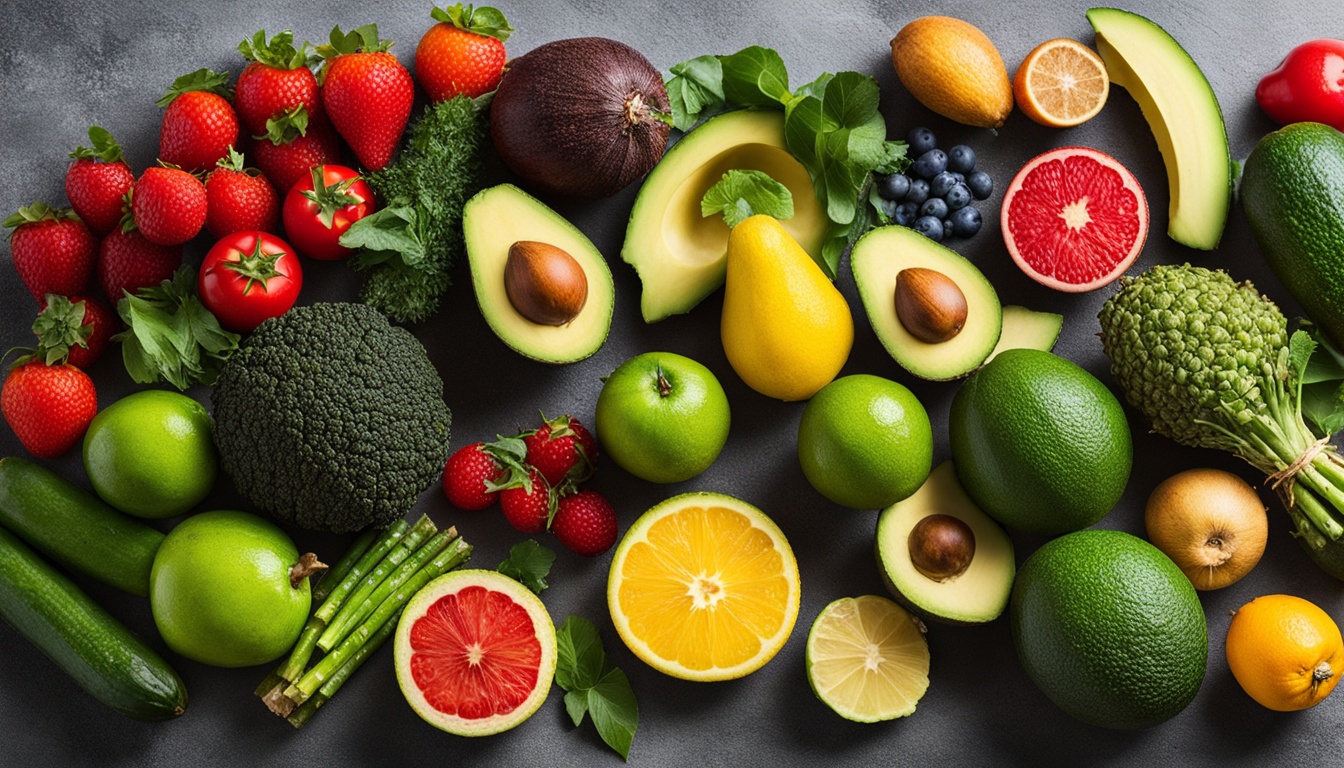Did you know that nearly 30% of Americans often feel bloated? This is often due to their food choices. Knowing which foods help or worsen bloating can greatly improve your comfort.
Belly bloat makes your stomach swell and can hurt. What you eat affects this. This guide will show you which foods ease bloating and which make it worse. You’ll learn about foods like bananas, celery, ginger, and peppermint tea that help. We’ll also discuss foods like high-sodium items, cruciferous veggies, and high-FODMAP foods that can make bloating worse.
Let’s dive into the science of belly bloat, its symptoms, and how to fight it. We’ll give you steps to keep your stomach feeling good.
Key Takeaways
- Bananas and avocados, rich in potassium, help balance sodium levels and reduce water retention.
- Celery and cucumbers, being highly hydrating, support digestion and lower inflammation.
- Ginger aids in the digestion process, reducing bloating efficiently.
- Peppermint and chamomile teas can relieve digestive tension, lowering bloat and discomfort.
- Avoiding high-sodium and high-FODMAP foods can significantly reduce bloating.
Understanding Belly Bloat
Belly bloat is a common issue that makes the stomach swell and hurts. Many things can cause it, so it’s important to know what they are. This knowledge helps in finding ways to lessen the discomfort and make the belly look smaller.
Causes of Belly Bloat
There are many reasons why people get bloated. Here are some main causes:
- Constipation: Not going to the bathroom regularly can cause belly pain and bloating.
- Irritable Bowel Syndrome (IBS): IBS affects up to 24% of women. It leads to ongoing bloating, pain, cramps, and diarrhea because of gas sensitivity.
- Food Intolerances: Some people can’t handle foods high in FODMAPs like wheat, onions, and garlic, which can make them bloated.
- Small Intestinal Bacterial Overgrowth (SIBO): SIBO is more common in people who have had surgery on their intestines or have IBS. It causes bloating.
- Gastroparesis: This condition slows down stomach emptying, leading to bloating, nausea, and bowel blockage.
- High Sodium Intake: Too much salt can cause water retention and make the belly swell.
Symptoms of Belly Bloat
Bloating can make the belly look bigger and may hurt. Knowing these signs helps in finding ways to ease the discomfort:
- Visible Swelling: A bigger belly is the main sign.
- Discomfort and Pain: People may feel different levels of discomfort or pain.
- Gas and Flatulence: More gas can make the feeling of bloating worse.
- Feeling of Fullness: Even a little bit of food can make you feel too full.
- Nausea: Nausea can happen with gastroparesis or severe constipation.
Knowing what causes and shows bloating is key to managing it. Changing your diet, drinking plenty of water, and knowing what makes you bloated are good ways to feel better. This can help reduce bloating and improve your health.
Top Foods That Help with Bloating
When dealing with belly bloat, what you eat matters a lot. Some foods can ease bloating, while others might make it worse. Let’s look at the best *bloating reducing foods* and how they help your stomach feel better.
Bananas
Bananas are great for fighting bloating. They’re full of potassium, which helps keep fluid balance and stops water retention. Plus, they have fiber that supports healthy digestion.
A 2011 study found that eating bananas twice a day helped women feel less bloated. This is because bananas help good gut bacteria grow.
Celery
Celery is more than just a crunchy snack; it’s a top food for reducing bloating. It’s full of water and fiber, which helps with digestion and makes stools softer. Celery also acts as a natural diuretic, getting rid of extra water and sodium in your body.
A 2017 study showed that celery’s apigenin helps good gut bacteria grow and improve digestion. Its high water and mannitol content also help fight bloating.
Ginger
Ginger is known for its digestive benefits. It boosts digestive juices, breaks down food, and helps your stomach empty faster. This can prevent bloating and feeling full after meals.
Studies have found that ginger speeds up stomach emptying and relieves digestive issues. Its anti-inflammatory effects also help reduce gas and bloating, making it a key food for *foods that help or hurt belly bloat*.
Adding these top bloating reducing foods to your diet can greatly improve your digestion and lessen belly bloat discomfort.
Why Some Foods Hurt Belly Bloat
Many people don’t know that some foods can make their belly swell. Foods high in sodium, certain veggies, and carbs can make bloating worse. Let’s look at why these foods cause bloating and how to feel better.

High-Sodium Foods
Eating foods high in sodium can cause water retention. This makes you feel puffy and adds to the bulge in your stomach. It’s important to watch how much sodium you eat and choose low-sodium foods to avoid bloating. Cutting down on processed foods is a good way to feel better.
Cruciferous Vegetables
Vegetables like broccoli, kale, and cabbage are good for you but can cause trouble. They have a sugar called raffinose that can lead to gas and bloating. These veggies are part of a group called FODMAPs, which can make bloating worse for people with IBS. If you’re sensitive, try eating these veggies less often or pick low-FODMAP ones instead.
FODMAP Foods
FODMAPs are carbs that your body has trouble absorbing. This can pull water into your intestines and cause bloating. Foods like beans, lentils, wheat, onions, and some dairy products are high in FODMAPs. Paying attention to the FODMAP content in your food can help you feel better.
| Foods | Bloating Cause | Relief Tips |
|---|---|---|
| High-Sodium Foods | Water Retention | Opt for low-sodium alternatives |
| Cruciferous Vegetables | Containing raffinose | Consume in moderation |
| FODMAP Foods | Poor absorption | Avoid high-FODMAP foods |
Knowing how certain foods can cause bloating helps you make better food choices. By following these tips, you can have a flatter, more comfortable belly.
Foods That Help or Hurt Belly Bloat!
Bloating affects 10% to 25% of people sometimes. Choosing the right foods can help you feel better every day. Let’s look at how staying hydrated and eating more fiber can help reduce belly bloat.
Hydration and Digestion
Drinking enough water is key for digestion and reducing bloating. It helps move food through your system, preventing constipation and gas. Aim for eight, eight-ounce glasses of water each day.
Hydration also flushes out sodium and toxins, reducing inflammation and bloating. Avoid drinks with carbonation and beer to cut down on bloating. Eating too fast or chewing gum can trap air in your stomach, making you feel bloated.
The Importance of Fiber
Fiber is important for regular bowel movements and preventing bloating. But, don’t eat too much or too little of it. Too little fiber can cause gas, while too much can lead to bloating too.
Adding moderate amounts of fiber from whole grains, fruits, and veggies to your meals can help. Foods like bananas, watermelon, and papaya are great for reducing bloating. Keeping a food diary to track which foods cause bloating can help you adjust your diet for relief.
Foods to Avoid for Bloating Relief
Bloating can be a real nuisance and often embarrassing. If you’re looking for ways to ease bloating, knowing which foods to avoid is key. This section will highlight foods to avoid for better digestion and comfort.

Dairy Products
Dairy products often cause bloating in many people. This is mainly because of lactose intolerance, affecting about 68% of people. If your body can’t break down lactose, it leads to gas and bloating. Reducing milk, cheese, and other dairy can help with bloating.
Processed Foods
Processed foods are often high in sodium and sugars, which can worsen bloating. These foods upset the balance of gut bacteria, causing digestive issues. Choosing whole, unprocessed foods can help reduce belly bloat.
| Factors | Dairy Products | Processed Foods |
|---|---|---|
| Main Cause of Bloating | Lactose Intolerance | High Sodium and Sugars |
| Populations Affected | 68% | General Population |
| Health Tip | Try Lactose-Free Alternatives | Opt for Whole Foods |
Probiotics and Belly Bloat
Adding probiotics to your diet can really help with belly bloat. These good bacteria are in many foods and keep your gut healthy. This can make you feel much better.
A 2018 study found that some probiotics can ease IBS symptoms like bloating. But, a 2021 guideline from the American College of Gastroenterology says probiotics aren’t proven to help IBS on their own.
Benefits of Probiotics
Probiotics are great for fighting bloating. A 2020 review showed they can help by changing the gut bacteria for the better. While many types of probiotics are studied, we need more research to know which ones work best.
People who eat probiotics, like those in fermented dairy, often have more bowel movements. This is good for your digestion.
Best Sources of Probiotics
To get the most from probiotics, eat foods like kefir, yogurts, sauerkraut, and kimchi. You can also take probiotic supplements, but it might take a few weeks to see changes. Be careful, as too much can cause gas or stomach pain.
Eating foods rich in probiotics can really help you beat belly bloat and improve your gut health.
| Probiotic Source | Benefits | Potential Side Effects |
|---|---|---|
| Fermented Dairy (Yogurt, Kefir) | Increased bowel movements, reduced gas and bloating | Possible gas and abdominal cramps |
| Fermented Vegetables (Sauerkraut, Kimchi) | Boosts beneficial gut bacteria, lowers inflammation | Initial increase in gas production |
| Probiotic Supplements | Alters gut microbiome for better digestion | Temporary bloating during adjustment period |
Herbs and Teas for Bloating
Bloating affects about 14% of people in the U.S., causing discomfort and inconvenience. Adding certain herbs and teas to your diet can help. These can ease digestive issues and offer relief from bloating. Let’s explore some top options.

Peppermint
Peppermint tea is packed with flavonoids that calm digestive tract bacteria. It relaxes the stomach muscles, cuts down gas, and eases bloating. Adding peppermint tea to your diet can help with bloating symptoms.
Chamomile
Chamomile tea reduces harmful bacteria, eases stomach pain, prevents diarrhea, and lowers gas. Its soothing effects help relax the digestive muscles and ease bloating. Drinking chamomile tea often can be a great way to manage bloating.
Fennel
Fennel seeds help ease digestive spasms and help gas pass through, reducing bloating. Fennel tea is known for easing constipation, gas, and stomach pain. Adding fennel to your diet is a smart way to fight bloating.
| Herb/Tea | Benefits |
|---|---|
| Peppermint | Relaxes gastrointestinal muscles, reduces gas |
| Chamomile | Decreases harmful bacteria, soothes pain, prevents diarrhea and gas |
| Fennel | Eases digestive spasms, decreases constipation, gas, and pain |
Anti-Inflammatory Foods
Reducing bloating and inflammation can make you feel better overall. Adding anti-inflammatory foods to your meals is a great way to do this. Let’s look at how foods like tomatoes and asparagus can help.
Tomatoes
Tomatoes are tasty and also fight bloating. They’re full of antioxidants like lycopene and potassium. These help keep fluid balance right and lessen bloating and inflammation.
These nutrients also fight oxidative stress and lower inflammation. So, tomatoes are a smart choice for your meals.

Asparagus
Asparagus is a strong anti-inflammatory food. It has inulin, a prebiotic fiber that boosts gut health and regularity. This can cut down on digestive problems, making it great for reducing bloating.
Eating asparagus often keeps your digestive tract healthy. This means fewer cases of bloating and inflammation.
| Food | Key Nutrients | Benefits |
|---|---|---|
| Tomatoes | Lycopene, Potassium | Reduces bloating, manages fluid balance, fights inflammation |
| Asparagus | Inulin, Fiber | Supports gut health, promotes regularity, reduces bloating |
Importance of Hydration
Drinking enough water is key for good health and fighting bloating. It keeps your body balanced with the right amount of sodium. This helps reduce belly bloat.
Water helps your body move nutrients and waste around. The Institute of Medicine says men need about 13 cups (3 liters) of water daily. Women should aim for 9 cups (2.2 liters).
Drinking enough water is a simple way to ease bloating. It dilutes excess sodium in your body. This stops fluid from building up in tissues and lessens puffiness from salty foods.
Processed and fried foods, salty snacks, and quick meals are often salty. They can make bloating worse.
Adding more water to your daily life can really help fight bloating. For the best results, eat more fiber too. The latest Dietary Guidelines suggest adults eat at least 14 grams of fiber for every 1,000 calories.
Good fiber foods for fighting bloating include fruits, veggies, beans, and whole grains.
Exercise and Bloating
Regular physical activity is a great way to fight belly bloat and boost your digestive health. Walking or jogging for 30 minutes can help by getting rid of gas and helping with digestion. This easy yet effective method can greatly improve your overall health.
If you want to reduce stomach bloating, try adding some yoga poses to your workout. Poses like Cat-Cow, Torso Twist, Extended Triangle Pose, Sphinx Pose, and Extended Puppy Pose can help with digestion and blood flow. The Sphinx Pose is good for digestion and should be done five times. Hold the Extended Triangle Pose for 15 seconds on each side to help your digestive system.
For a relaxing way to ease bloating, try the Extended Puppy Pose for 30 seconds to a minute. This pose can help soothe your stomach and reduce discomfort.
Watching what you eat and how you exercise can help you figure out what works best for managing bloating. Combining these activities with a balanced diet can keep your digestive system healthy and reduce bloating. But if bloating doesn’t go away and lifestyle changes don’t work, you should see a doctor. They can check for any serious issues.
Regular exercise and specific workouts are key to a healthy gut and less bloating. They help keep your digestive system running smoothly.
When to Seek Medical Advice
Knowing when to get help for bloating is key, especially if it’s ongoing or bad. Some signs should not be ignored as they could mean serious health problems.
Warning Signs
Bloating that lasts over two weeks might signal a serious issue, like ovarian cancer, as the Centers for Disease Control and Prevention (CDC) notes. If bloating comes with signs like losing weight, severe stomach pain, seeing blood in stool, or constant diarrhea, see a doctor right away. The American College of Gastroenterology says conditions like gastroparesis can cause bloating, nausea, and feeling full too quickly.
Consulting a Healthcare Provider
If your bloating is bad, lasts a long time, or has other symptoms, get medical advice. Tests like blood tests, stool tests, gastroscopy, colonoscopy, biopsies, and ultrasounds can find the cause. The International Foundation for Gastrointestinal Disorders says gastroparesis needs a doctor’s check-up. Treatment often means changing your diet, avoiding certain foods, and taking medicines that help with digestion. Talking to your doctor about which foods help or hurt your bloating can also be helpful.
Knowing when to get help for bloating can lead to early diagnosis and better treatment of any underlying issues. Don’t wait to talk to a healthcare professional if you have worrying symptoms.
Conclusion
Dealing with belly bloating often means taking a few steps. Studies like “Abdominal bloating in employed adults” show how common and impactful bloating is. Making changes in your diet, how much water you drink, and your lifestyle is key.
Eating foods like bananas, celery, and ginger can help fight bloating. On the other hand, avoiding foods high in sodium, cruciferous veggies, and FODMAP foods can also help. Making smart food choices can make a big difference.
Drinking plenty of water and staying active are also important for your gut health and reducing bloating. Don’t forget about probiotics and herbal remedies like peppermint, chamomile, and fennel. These can be great for easing bloating. If bloating gets worse or doesn’t go away, it’s time to see a doctor.
Learning what causes bloating for you and using the right tips can help reduce bloating. This approach can give you quick relief and improve your long-term digestive health.
FAQ
What foods can help relieve belly bloat?
How does ginger help with bloating?
Are there any teas that can relieve bloating?
Which foods should be avoided to prevent bloating?
How does staying hydrated help with bloating?
What role do probiotics play in reducing bloating?
When should I consult a healthcare provider about my bloating?
What are some anti-inflammatory foods that can help with bloating?
How does fiber intake relate to bloating relief?
Can physical activity help reduce bloating?
Source Links
- https://www.health.com/food/best-and-worst-foods-for-bloating – These 9 Foods Can Cause Bloating—Here’s How
- https://health.clevelandclinic.org/foods-that-help-with-bloating – Foods That Help Reduce Bloating
- https://www.mayoclinic.org/diseases-conditions/gas-and-gas-pains/in-depth/gas-and-gas-pains/art-20044739 – Practical tips to reduce bloating, belching and gas
- https://www.hopkinsmedicine.org/health/wellness-and-prevention/bloating-causes-and-prevention-tips – Bloating: Causes and Prevention Tips
- https://iffgd.org/gi-disorders/symptoms-causes/bloating-and-distension/ – Understanding Bloating and Distension – IFFGD
- https://www.mayoclinic.org/medical-professionals/news/understanding-and-managing-chronic-abdominal-bloating-and-distension/mac-20511032 – Understanding and managing chronic abdominal bloating and distension – Mayo Clinic
- https://www.medicalnewstoday.com/articles/foods-that-help-with-bloating – 15 foods and drinks that help with bloating
- https://www.healthline.com/nutrition/foods-that-help-with-bloating – 20 Foods and Drinks That Help with Bloating
- https://www.bmhsc.org/blog/13-foods-that-reduce-bloating – 13 Foods That Reduce Bloating
- https://www.webmd.com/digestive-disorders/features/bloated-bloating – Bloating 101: Why You Feel Bloated
- https://my.clevelandclinic.org/health/symptoms/21740-bloated-stomach – Bloated Stomach: Causes, Tips to Reduce & When to be Concerned
- https://www.healthline.com/nutrition/13-foods-that-cause-bloating – 13 Foods That Cause Bloating (and What to Eat Instead)
- https://www.osfhealthcare.org/blog/why-youre-bloated-and-how-to-get-fast-relief/ – Why you’re bloated and how to get fast relief
- https://health.clevelandclinic.org/foods-that-cause-bloating – The recipe for a bloated belly often starts with these ingredients
- https://www.nm.org/healthbeat/healthy-tips/nutrition/how-to-beat-the-bloat – How to Beat the Bloat
- https://www.webmd.com/diet/features/foods-avoid-bloating – Foods to Avoid if You’re Feeling Bloated
- https://www.cnbc.com/2023/03/31/harvard-gut-doctor-shares-foods-that-cause-bloating-and-what-she-eats-instead.html – Harvard gut doctor: These 8 foods will make you feel bloated—here’s what to eat instead
- https://www.healthline.com/health/digestive-health/probiotics-bloating – Probiotics and Bloating: Treatment, Side Effects, More
- https://zoe.com/learn/probiotics-for-bloating – Do Probiotics Relieve Bloating, and What Else Can Help?
- https://www.healthline.com/nutrition/tea-for-bloating – 8 Herbal Teas to Help Reduce Bloating
- https://www.artoftea.com/blogs/health-lifestyle/best-teas-for-bloating – Art of Tea: Organic Loose Leaf Teas, Tea Bags & Tea Gift
- https://www.hopkinsmedicine.org/health/wellness-and-prevention/anti-inflammatory-diet – Anti Inflammatory Diet
- https://www.webmd.com/diet/anti-inflammatory-diet-road-to-good-health – Anti-Inflammatory Diet: Road to Good Health?
- https://www.prevention.com/health/g43739176/foods-to-help-ease-bloating/ – Feeling Bloated? These Foods Help, According to Nutrition Experts
- https://www.healthline.com/nutrition/how-to-debloat – How to Debloat: 8 Simple Steps and What to Know
- https://www.brighamandwomens.org/patients-and-families/meals-and-nutrition/bwh-nutrition-and-wellness-hub/special-topics/gas-beat-the-bloat – Gas & Bloating: Natural Remedies
- https://www.healthline.com/health/fitness-exercises/exercise-for-bloating-and-gas – This Genius 5-Minute Workout Will Stop Your Bloating
- https://www.healthline.com/nutrition/proven-ways-to-reduce-bloating – 12 Proven Ways to Reduce or Stop Bloating
- https://www.medicalnewstoday.com/articles/bloated-stomach-feeling-sick-and-tired – Bloated stomach, feeling sick, and tired: Causes and what to do
- https://www.healthdirect.gov.au/bloating – Bloating
- https://www.ncbi.nlm.nih.gov/pmc/articles/PMC4991532/ – Management Strategies for Abdominal Bloating and Distension
- https://www.ncbi.nlm.nih.gov/pmc/articles/PMC3264926/ – Pathophysiology, Evaluation, and Treatment of Bloating: Hope, Hype, or Hot Air?

